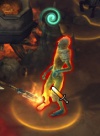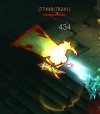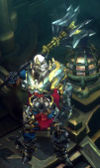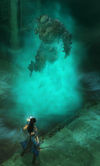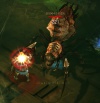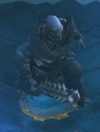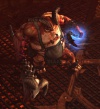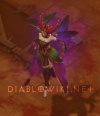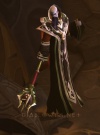Bosses are superunique monsters that appear during a quest-related event with special graphics and story significance in Diablo III. Many quests and all of the acts end with an epic boss battle, which must be survived in order to continue advancing through the game.
Regular "boss" monsters are normal monsters with increased stats and special boss modifiers. These types of monsters, in Diablo III, are referred to as elites. Elites are not bosses, but they play into the end game with the Nephalem Valor buff system.
- See the Elite article for general info about elite enemies.
- See the Boss Modifiers article for boss bonus properties.
- See the End Game article for information about the end game.
- See the Nephalem Valor article for information about the end-game buff.
Contents
Bosses and Nephalem Valor
The categorization of what precisely a boss is has changed a bit from Diablo II to Diablo III. This is mostly due to the nephalem valor buff. When a player kills a randomized elite group of rares or champions, they are granted one stack of the nephalem valor buff that lasts for thirty minutes. Each stack gives an increase to Gold Find and Magic Find, and in addition increases the number of items that a boss will drop. The buff stacks up to five, and at a full stack, it will allow a boss to drop numerous Magical and Rare-quality items. Only rare and champion elites count towards the buff, and only bosses are granted the additional item drops, so the nephalem valor system works hand-in-hand with boss runs in D3.
With that said, what is considered a "boss" in Diablo III is a superunique who is part of a quest that will drop additional loot with the nephalem valor buff.
Bosses by Act
Below is a list of each boss in accordance with when they appear in the game, chronologically, with bits of information listed. Visit each bosses' individual entry for more detailed information.
Act I
The following bosses are located in Act I:
Captain Daltyn
Images and information coming soon.
Mira Eamon
Images and information coming soon.
Chancellor Eamon
Being an Eamon, the Chancellor's suffering, of course, didn't end with simple death. Images and information coming soon.
Leoric, the Skeleton King
The Skeleton King returns in Diablo III, and he's up to his old skeleton-summoning tricks. He's found sitting on his throne, must be awakened by the use of his broken crown, after being repaired by the blacksmith. He is encountered at the end of the Reign of the Black King quest, and does not return in a good mood. Leoric wields a gigantic hammer and commands a vast army of the undead. See The Skeleton King quest article for more details.The Spider Queen Araneae
Images and information coming soon.
The Warden
Images and information coming soon.
The Butcher, Flesh Carver
Images and information coming soon.
Act II
The following bosses are located in Act II:
Maghda, Leader of the Coven
Images and information coming soon.
Zoltun Kulle, Betrayer of the Horadrim
Images and information coming soon.
Belial, Lord of Lies
Images and information coming soon.
That One Berserker Dude in Alcarnus
Images and information coming soon.
Creepy Guy in the Sewers
Images and information coming soon.
Act III
The following bosses are located in Act III:
Ghom, Lord of Gluttony
Images and information coming soon.
Siegebreaker Assault Beast
"Living siege Engine of Hell". The Siege Breaker is an absolutely massive "miniboss" first shown in the WWI 2008 gameplay video. He was originally found in what was then-named the Leoric Highlands for the game's announcement video. Since then, he was moved to the middle of Act III, and is encountered at the end of the quest named Siegebreaker.Cydaea, Maiden of Lust
Images and information coming soon.
Azmodan, Lord of Sin
Images and information coming soon.
Act IV
The following bosses are located in Act IV:
Iskatu
Images and information coming soon.
Izual the Fallen
Images and information coming soon.
Rakanoth, Lord of Despair
Images and information coming soon.
Diablo, the Prime Evil
Images and information coming soon.
Development Goals
The following information has been saved from the development phase of Diablo III and contains numerous quotes from the developers, dating back to 2008.
Lengthy Boss Battles
One thing the developers have talked about is their goal to create larger, multi-stage, more impressive battles in Diablo 3. They aren't going to be happy with just one big boss players must spend lots of time spent whacking away at. They want the big fights to involve more variety and difficulty, and this was seen to some extent in the way that the Skeleton King kept resurrecting more skeletons during his battle, at the end of the 2008 Blizzcon demo.
This issue was discussed by Kevin Martens and Julian Love during an interview at Blizzcon 2009. [1]
- Diii.net: I’m curious to hear more about the big bosses in the game. The only one that’s been seen is the Siegebreaker, and Jay Wilson said that he wasn’t even an Act Boss. So what does an act boss look like? What will an encounter of that sort be like for players?
- Kevin: Players will know they’re up against a big boss when they have to change their gameplay style. You won’t be able to just charge in and keep using the same tactics you use against a group of Fallen. You have to be more careful against a big boss. A tank character can’t just stand and tank as he’s used to. New strategy will be required. We want to make bosses interesting and powerful. They should be a challenge and be varied in what they require of all classes and abilities, as well as from parties. We want to make bosses more interesting than in the previous Diablo games. We look forward to showing them off, but we can’t talk about any specifics yet.
- Diii.net: When Siegebreaker dies in the WWI gameplay movie, he spawns about a thousand skeletons from his corpse. Is that the sort of thing we’ll see from big bosses? Multi-stage events?
- Kevin: Some may be multistage. Some don’t need to be that way. It depends on the boss, the stage, the player level, etc. We require different tactics to keep it interesting. We can’t pre-plan everything at this stage, since we don’t know what range of levels the players will be when they reach the boss. And we need to consider how to keep the boss fun through additional encounters. So the third or tenth time a player fights the boss, it’s still fun and exciting.
- Julian: We also want to use bosses to move the story forward. We have story-based elements to vary the bosses. For one thing, we gave the bosses different ways to kill players.
- Diii.net: Like when Siegebreaker bites off the Barbarian’s head?
- Julian: That’s his way of killing players, but that’s not the only way a boss can finish off a player.
To assist players in these long, treacherous battles, boss monsters will periodically drop health globes during the fight. [2]
- Jay Wilson: ...we deal with some of the harder monsters, like bosses and rares and champions ...they would drop health globes at percentages of their health. Rares in particular are almost guaranteed to drop about every 25%. The other thing we did, because we design everything for cooperative play, if you pick up a health globe and you have a friend nearby, you both get the benefit. So that's something we did to make sure the system didn't favor people who are running forward, melee classes, who used to pull up all the health potions. Now they're actually helping the people in the back.
| Monsters of Diablo III[e] Beasts Beasts: Superunique Demons Demons: Superunique Humans Humans: Superunique Undead Undead: Superunique Objects Bosses Boss Mods Monster Info Fanmade |
|---|
| Beasts | Bat - Beast - Blood Hawk - Demonic Hellflyer - Electric Eel - Khazra - Lacuni - Lamprey - Quill Fiend - Rockworm - Sand Monster - Sand Shark - Sand Wasp - Scavenger - Spider - Spiderling - Swarm - Withermoth - Wood Wraith - |
|---|
| Demons |
Armored Destroyer - Dark Berserker - Deceiver - Fallen - Ghoul - Hellion - Thrall |
|---|
| Undead |
Accursed - Bone Reaver - Brigand - Dune Dervish - Ghost - Ghoul - Grotesque - Morlu Caster - Risen Dead - Skeleton - Skeleton Mage - Unburied - Wraith - Wretched Mother |
|---|
| Primary Quest Uniques |
Act One Bosses:
Araneae -
Skeleton King -
The Warden -
The Butcher
|
|---|
|
| |||||
|---|---|---|---|---|---|
| Uniques Modifiers |
Strong CC (Limit 1): Knockback -- Nightmarish -- Vortex -- Jailer | ||||
| Removed Modifiers |
| ||||
|
| |||||
| Act One Uniques | Araneae - Web Spit | Leoric - Summon Skeleton, Teleport Strike, Triple Cleave | The Butcher - Smash, Grappling Hook, Spear, Frenzy Charge | ||
| Act Two Uniques | Maghda - Forcefield, Summoning Ritual, Punish, Moth Dust, Teleport. | Zoltan Kulle - Fiery Boulder, Time Bubble, Ceiling Collapse, Energy Twister,Vanish, Creepy Laugh | Belial - Phase One: Triple Fireball, Summon Vipers. Phase Two: Poison Meteors, Ground Pound, Lightning Strike, Lightning Breath. | ||
| Act Three Uniques | Ghom - Acid Slime, Sneeze, Gas Cloud, Chomp. | Siegebreaker - Triple Hit, Charge, Leg Stomp, Grab and Throw. | Cydaea - Pain Bolts, Web Trap, Spider Pits. | Azmodan - Bellyflop, Laser Attack, Falling Corpses, Demon Gate, Pool of Destruction, Globe of Annihilation. | |
| Act Four Uniques | Rakanoth - Cleave, Teleport Strike, Blade Strike, Volley, Summon Minion. | Izual - Frost Nova, Frozen, Summon Minions. | Diablo - Phase One: Claw Rip, Charge, Hell Spikes, Shadow Vanish Grab, Curse of Destruction, Ring of Fire, Ground Stomp, Curse of Anguish, Curse of Hatred. Phase Two: Shadow Clone. Phase Three: Overdrive, Lightning Breath. | ||
| Monster Info |
Monsters Basics -
Bosses -
Boss Modifiers -
Champions -
Quest bosses -
Teeth of Diablo -
Fan-made monsters
|
|---|
